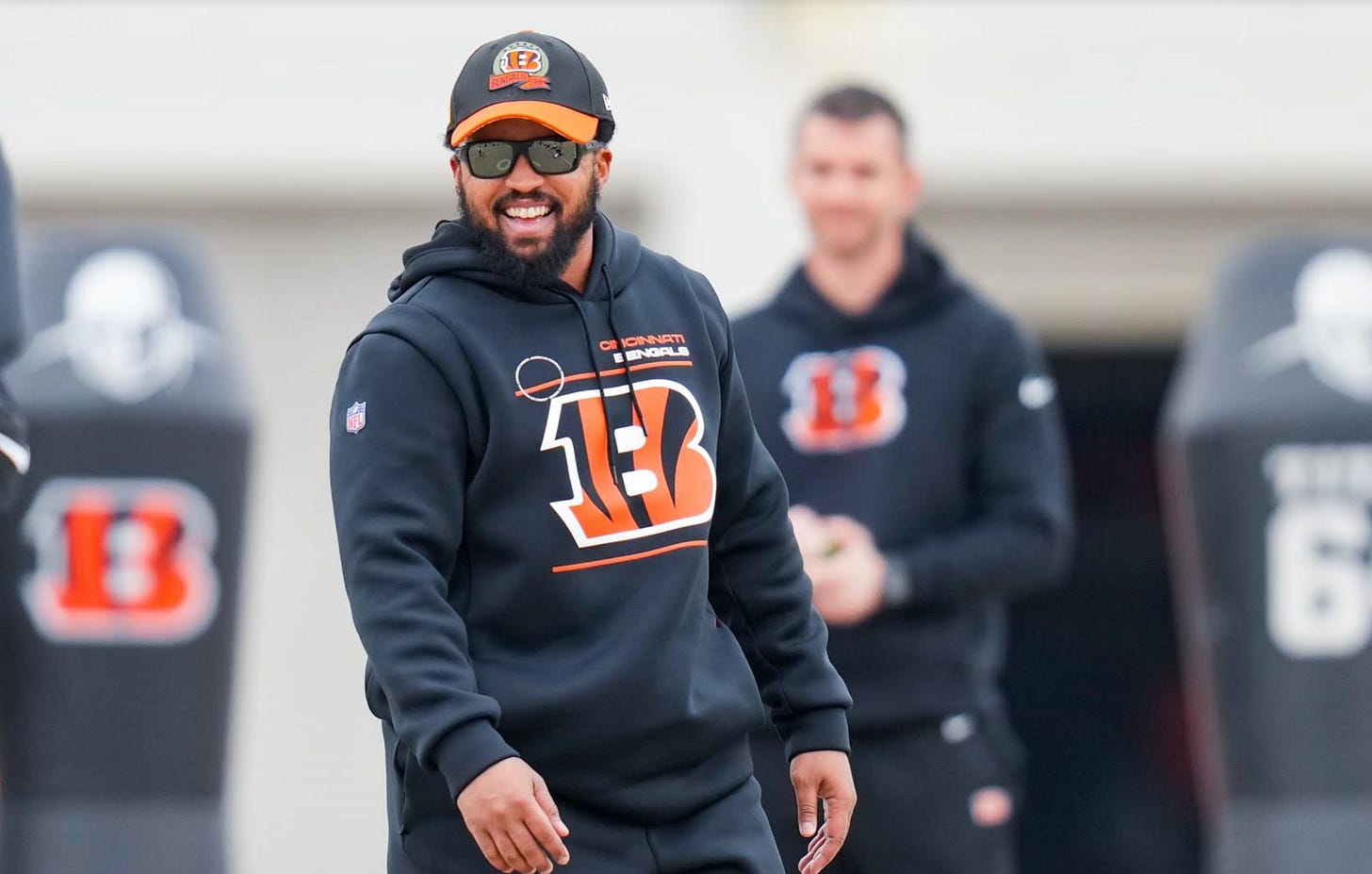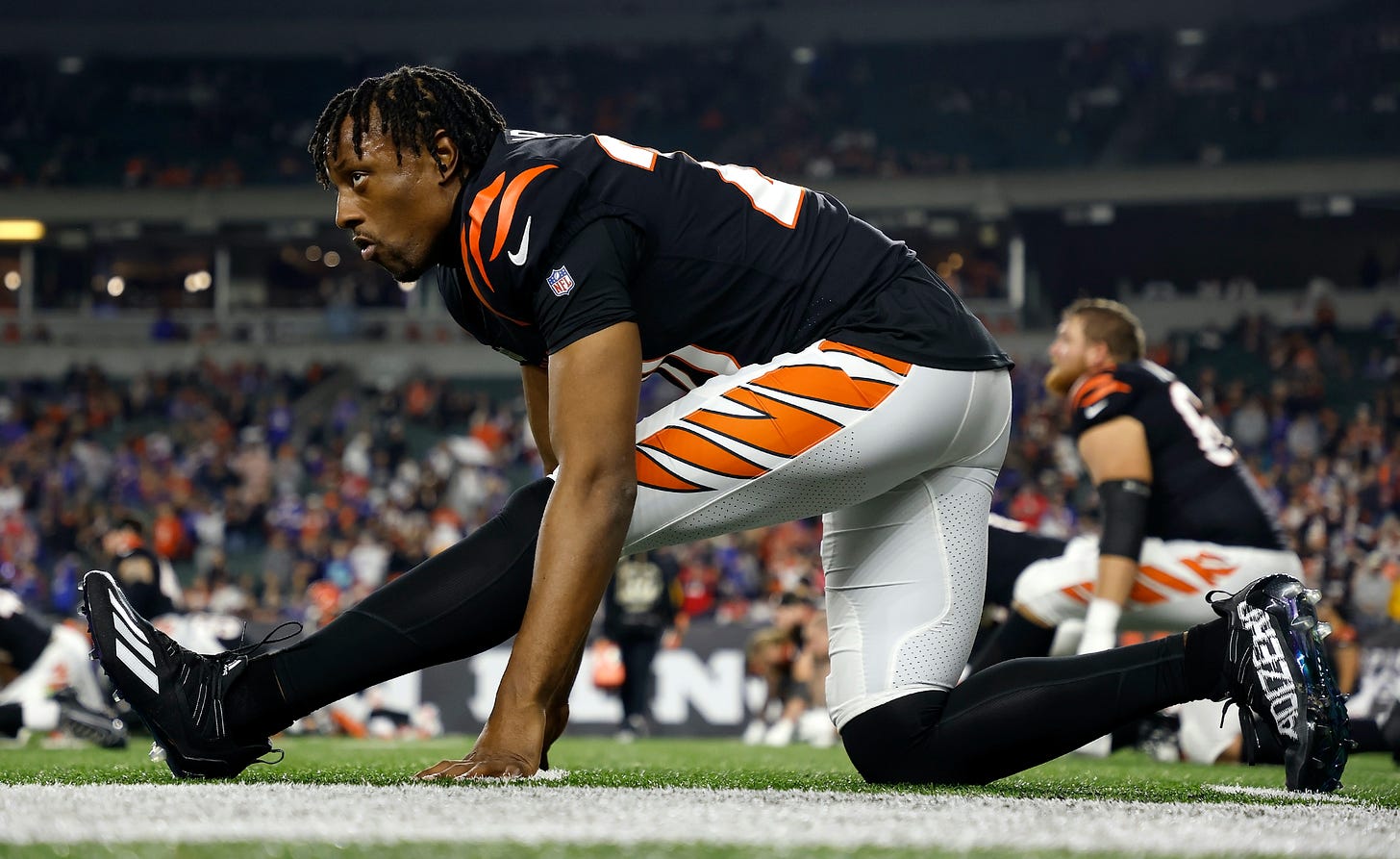Bengals' coach Charles Burks on his CB room: 'They’ve got an edge'
This meeting room is not for everyone. Here is the Cincinnati Bengals' cornerbacks/secondary coach on Eli Apple, Cam Taylor-Britt, Mike Hilton and an attitude that's always encouraged.
Love ‘em. Hate ‘em.
You will hear from the Cincinnati Bengals’ defensive backs regardless.
Eli Apple had himself quite a week, creating a new legion of enemies in Buffalo. Mike Hilton declared the Kansas City Chiefs’ stadium “Burrowhead,” bringing the entire team’s confidence to life. I cannot recall the Cincinnati Bengals eliciting so much emotion in my lifetime and — to their credit? — this defense is leaning hard into its “villain” role. There’s no retreat to the hills. The energy source for the entire team can be felt on this side of the locker room, with all of these DBs.
Here’s our feature from Cincinnati, icymi.
What a fun Championship Sunday ahead.
This seemed like a fine week to catch up with the assistant coach in the middle of it all, too.
Here’s my conversation with Charles Burks, the Bengals’ first-year secondary/cornerbacks coach, who came over from the Miami Dolphins.
He takes us all inside this team’s mentality a little further.
Thanks, all.
You know your room best. What makes these corners special?
Burks: I think there’s a collective identity of just being tough. They’re tough. They’re confident. And they want to win. And it’s collective — it’s not just one person. It’s a shared identity that everyone has. Those guys don’t back down from anything. And they like all parts of the game. They like the physical part, the dirty work that they have to do to put them in position to make plays on the ball when eventually they start throwing the ball.
Every team talks about being counted out. “Nobody’s respecting us. Nobody likes us.” But Mike Hilton still remembers Mark Richt telling him he’s not good enough for Georgia. The Steelers don’t want him. With Eli Apple, the whole world hates him. But how does this all manifest onto the field? How do they use this disrespect to shut down Patrick Mahomes, to shut down Josh Allen, to do what they’re doing on Sundays?
Burks: Honestly, it’s a bunch of guys who’ve had to earn this opportunity. Nothing was given to any of them. And they’ve all gone through their own individual adversity that they use on the field. It seeps out in the meeting room. It seeps out at practice. They’re chippy. They’ve got an edge. They’re chippy with each other. They’re always joking around with each other. They’re very hard on each other. There’s a lot of real conversations that go on in the meeting room. And there’s accountability amongst the group. I think that’s the other part. If you’re not a tough person, you couldn’t be in that meeting room with those guys.
How so?
Burks: They just wouldn’t let you. It would be a very uncomfortable place for you because, again, those guys earned the right to sit in that seat. They went through things to sit in this seat to be in this opportunity. So if you’re a guy who isn’t cut from that cloth, everybody will know that real fast.
The meeting room is a sacred place. But it can really stem from joking to actually — if you’re not playing up to par — conversations are had amongst the group. Not just coaches. These guys take real pride in making it look a certain way. It’s one thing to play well. But when we play, we want it to look a certain way.
I forget Chidobe Awuzie, too.
Burks: He’s another guy. If you look at his story, he’s a guy who was at Dallas. His career started there. He came to Cincinnati and he wanted to prove something to himself. And he did. “Chido” is really the ringleader of the whole group. I have nothing but great things to say about him. He’s competitive. He’s smart. He’s a pro’s pro.
How driven is Mike Hilton with what he’s been through?
Burks: Extremely driven. I’ll give you this story. Before our last game, we were doing night meetings with Lou (Anarumo). We were sitting down before everything gets started, and I was sitting behind Mike. I just asked Mike, “Hey, do you have that dog in you?” And it ticked him off. I could tell. He looked back at me and smiled. But I started laughing to myself because it’s something as little as that, that can set these guys off. I’m not saying that’s the reason he played well at all, but that’s the mentality amongst the group. It doesn’t take much. There’s not a lot of convincing when I go into a meeting room.
That’s all you said?
Burks: That’s all that’s said.
Like you’re almost questioning him — do you really have that in you?
Burks: Exactly. Exactly. I try to hold my laugh. I try to hold my smile. Just because I knew who I was speaking to. But as soon as he looked back at me, I just died laughing. Just because that’s not even a question.
This was when you guys put up that the Bills had only lost once at home in the playoffs — the winningest postseason team ever. That’s a moment where it’s hard to motivate grown adults. There’s nothing these guys haven’t heard. They’ve been through the rah-rah. Motivation seems intrinsic for these guys.
Burks: It is. And it has to be intrinsic. It’s not just a football thing. If you’re doing something that’s important to you, and you want to be exceptional at it, intrinsic motivation is just something you’ve got to have. One thing we talk about amongst the room is you have to have a great routine. You have to have great attention to detail. And you have to be self-motivated. If you have all three of those things, you can prepare the right way and you’ll be a professional football player.
And they are legitimately self-motivated?
Burks: Exactly. This is ain’t a “motivate every day type of deal.” You have to have self-motivated, self-started players to win in these moments.
I’ve never seen a player hated like Eli Apple and he did ask for it this week. How does he feed off of it? It seems like he turns heel and it gets him going?
Burks: I don’t see everything that he posts. The only thing I’d say is, look man, when we were growing up and playing this game? We were talking trash to each other. Somehow, some way, it gets on social media and it’s whatever people will make of it. But people talk crap. We have been talking crap to each other playing sports and being competitive since we were kids. It’s not anything new. It’s just Twitter. Twitter makes it seem like it’s something new. People do it. People have been doing it. And people are going to keep doing it. As long as there’s professional sports, there’s going to be trash talking.
We’re talking about the most violent game on earth. You’re asking red-blooded, testosterone-fueled, grown-ass men to hit each other for a living. You can’t reel that in. That’s why the taunting penalties drive me nuts, and all of these defensive penalties. You’re asking these guys to be something else. How do you let guys like Eli and Mike be themselves in this world?
Burks: As a coach, I’m not about control. I’m about expression. So be yourself as long as you’re protecting the team. Sometimes, things get to a point where if it’s becoming a distraction, you’ve got to address it. And I’ll keep that between the team obviously. But at the end of the day, this is a gladiator sport and I want my guys to be extremely competitive. And that looks different for every particular person — and I don’t want to alter that person because they’re here for a reason. I want that person to express themselves to the fullest. As long as he protects the team while he’s doing it.
What is something about Eli that people don’t know?
Burks: Eli is very calculated. Very calculated. He’s extremely smart. I love me and Eli’s conversations. It’s give and take. I personally had to do a really good job of learning Eli the man — and it’s the same with all my guys — but learning Eli the man in order to coach the player. And the more I learned about Eli, the better it was to coach Eli. It’s definitely been a process. And it’s been a great process. But he loves it. He loves football. He loves his team. He loves the fans. He loves everything that comes with it. The beautiful thing about this sport is, everybody gets to see these guys go through adversity in real time. They get to see them react and respond in real time. That’s the beautiful thing. That’s why everybody loves this sport. And Eli’s no different. These guys are all human so everybody wants to be treated with respect and they want you to be honest with them. It’s no different than anything. You’d do that when you’re coaching Pee Wee. Treat players with respect and be honest with them, and you can coach any player you want.
What did you learn about Eli as a human being when you went through that process? Because he was clashing with several teams and with coaches before you.
Burks: Really, I just listened. Just listening. Things that makes him uncomfortable. Things that he’s comfortable with. That was a process in OTAs and training camp. Before I went in and really started coaching him, I really had to take that process of, “Let me learn this. That way, when I correct it, I can correct this very aggressively. And this is something he feels comfortable with, maybe let him do that.” It’s not about control.
The Chiefs game last year. When he had that hit that is when everything turned and the entire defense started talking back to Tyreek Hill and the Chiefs. You’re a group that feeds off that.
Burks: One thousand percent. One thing I love about him is Eli won’t back down from anybody. So if you give me a player who won’t back down? I’ll find a way to work with him.
The Super Bowl — that last play — that’s a moment that can end guys’ careers. We don’t hear from them again. How did he respond to that here?
Burks: I was in Miami. But into the spring and summer? I don’t really care about that honestly. We are what we are right now. What’s happened in the past has happened. And we’re creating our own history right now.
What about Cam Taylor-Britt? He made some big plays in Buffalo. What is something people should know about him?
Burks: Cam fits in extremely well with the group. He’s extremely competitive. He’s one of the toughest players I’ve ever been around in my entire career. Because he’s not afraid of anything. He’ll go in there. Just watch the Browns game, the first game that he started. He hit an offensive tackle — hit him in the backfield. Go watch the game. He’s extremely competitive and he's a sponge. He loves to learn. It’s been great to watch him grow each game. He’s grown each practice. You can see that maturation. He has to continue to get better. The thing about last week is he can be better. And he understands that.
That third and 2 on Gabe Davis. If he doesn’t make that play, who knows what happens in that game?
Burks: A huge play. Huge play.
The X’s and O’s with Lou, it seems like everything is on the same page. You’re timing up the disguises, the stunts, everything. Why are you able to confuse these quarterbacks schematically where other teams — every other team — hasn’t been able to?
Burks: I think Lou does a good job of teaching the “why.” And then we have smart players, so a lot of things happen organically. Communication is something that’s very, very big in our room. They understand the big picture. They understand why they’re doing it. And then as a coach, again, they’re playing the game. So a lot of things happen organically and I think that’s from them being able to disguise so well. Sometimes, we watch the film and I say, “Man, that’s pretty damn good.”
Like someone knowing when to jump a route?
Burks: Not necessarily jumping but presenting a different presentation.
Pre-snap?
Burks: Exactly. The best secondaries that disguise, it’s organic. Not necessarily controlled.
One play it looked someone was blitzing to the left of Josh Allen and then the blitz came from the right — and the timing was perfect before the snap to where he didn’t have time to wait and adjust. Usually quarterbacks adjust. Like Joe.
Burks: Joe’s different. Joe’s from another planet.







